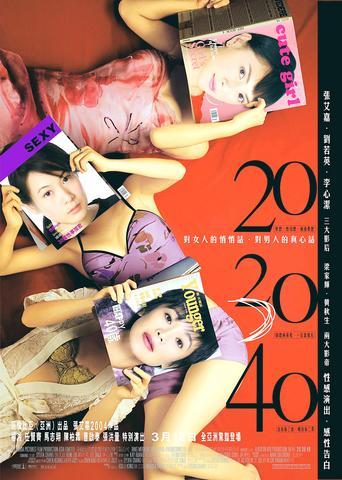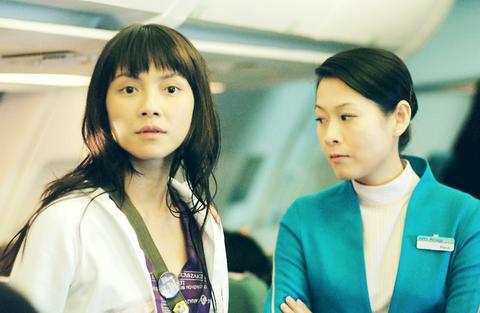Silvia Chang's (
One of the rare women filmmakers in Chinese-language films, Chang has managed to make a movie every two to three years since 1986. Apart from her directing work, she runs her own artist-management business, while once in a while still acting in a few Hong Kong movies and also releasing records as a singer. And every now and then, her so-called "chick movies" will come out as impressive surprises, such as this 2004 Berlin Film Festival entry, 20, 30, 40.

In keeping with the trend of romantic comedies trying to mirror Sex and the City or Bridget Jones' Diary, which honestly reveal the awkwardness, defeat and cruelty women face in the games of love, 20, 30, 40 movie offers a Chinese version on these by-now familiar themes.

PHOTO COURTESY OF COLUMBIA ASIA
20, 30, 40 meets its expectations, being an honest, cute, semi-feminist movie about women in Taipei.
The 30-something woman Hsiang-hsiang (Rene Liu (劉若英)) is a flight attendant torn between two men -- one a musician in New York, who is not mature enough to settle down, the other a mature doctor, but married. Hsiang-hsiang is always reminded of her mom's reasons for forcing her to learn piano. "One day your man will leave you, so at least you can teach piano."
The 40-something Lily (Silvia Chang) takes a flight tended by Hsiang-hsiang back to Taipei, with her husband and 17-year-old daughter. A happy wife and mother who owns a flower shop, Lily finds out about her husband's mistress and decides on an immediate divorce. On the same flight is Jie (Lee Sin-jie, (李心潔)), a 20-something Malaysian girl coming to Taiwan to become a singer. She is teamed up with a Hong Kong girl by a sloppy, down-on-her-luck producer-songwriter and she is unsure about her future.
The most honest and moving story between the three women is the 40-something Lily, portrayed by director Chang herself. Trying to prove that she's still attractive, she spends wild nights at Taipei's Carnegie's and dates a young man whose two obsessions are sex and sports, the former of which wears out her middle-aged bones.
As a director, Chang this time has a more open, easy and mature eye when looking at a woman's life, than her 1999 film Tempting Heart (心動), which was an equally touching, though slightly forced, story about a nostalgic romance. Lily's story generates the most laughs as well as tears.
Also impressive is Jie's story, performed and written by Lee Sin-jie, wth obvious autobiographical elements. An ambiguous feeling grows between Jie and Tung, the Hong Kong girl, who tries to seduce her. Jie is not sure if she's jealous when she sees Tung suddenly find a boyfriend. Also uncertain is her bumpy singer dream, because no one wants to make a record for the duo.
Rene Liu makes full use of her solid acting skills, but her story is a bit thinner than those of the other two women.
And as for men in this movie, no doubt they are minor characters, but Silvia Chang scored a casting coup, getting both Tony Leung Kar-fai (
20, 30, 40 may not be Silvia Chang's best movie so far, but it is by far the most honest and sincere work about women's loves and lives in Taipei.

The only geopolitical certainty is that massive change is coming. Three macro trends are only just starting to accelerate, forming a very disruptive background to an already unsettled future. One is that technological transformations exponentially more consequential and rapid than anything prior are in their infancy, and will play out like several simultaneous industrial revolutions. ROBOT REVOLUTION It is still early days, but impacts are starting to be felt. Just yesterday, this line appeared in an article: “To meet demands at Foxconn, factory planners are building physical AI-powered robotic factories with Omniverse and NVIDIA AI.” In other words, they used AI

Last month historian Stephen Wertheim of the Carnegie Endowment for International Peace published an opinion piece in the New York Times with suggestions for an “America First” foreign policy for Democratic presidential candidate Kamala Harris. Of course China and Taiwan received a mention. “Under presidents Trump and Biden,” Wertheim contends, “the world’s top two powers have descended into open rivalry, with tensions over Taiwan coming to the fore.” After complaining that Washington is militarizing the Taiwan issue, he argues that “In truth, Beijing has long proved willing to tolerate the island’s self-rule so long as Taiwan does not declare independence

Big changes are afoot in global politics, which that are having a big impact on the global order, look set to continue and have the potential to completely reshape it. In my previous column we examined the three macro megatrends impacting the entire planet: Technology, demographics and climate. Below are international trends that are social, political, geopolitical and economic. While there will be some impact on Taiwan from all four, it is likely the first two will be minor, but the second two will likely change the course of Taiwan’s history. The re-election of Donald Trump as president of the US

Nov. 25 to Dec. 1 The Dutch had a choice: join the indigenous Siraya of Sinkan Village (in today’s Tainan) on a headhunting mission or risk losing them as believers. Missionaries George Candidus and Robert Junius relayed their request to the Dutch governor, emphasizing that if they aided the Sinkan, the news would spread and more local inhabitants would be willing to embrace Christianity. Led by Nicolaes Couckebacker, chief factor of the trading post in Formosa, the party set out in December 1630 south toward the Makatao village of Tampsui (by today’s Gaoping River in Pingtung County), whose warriors had taken the